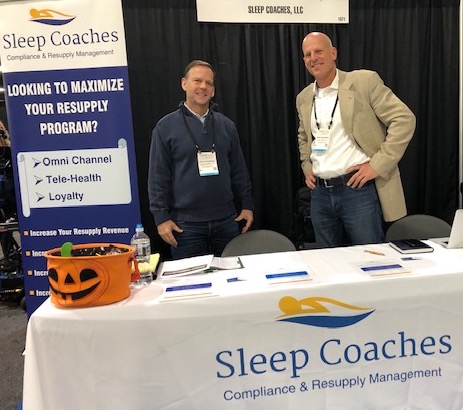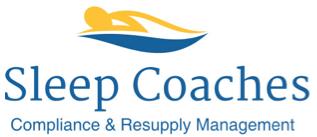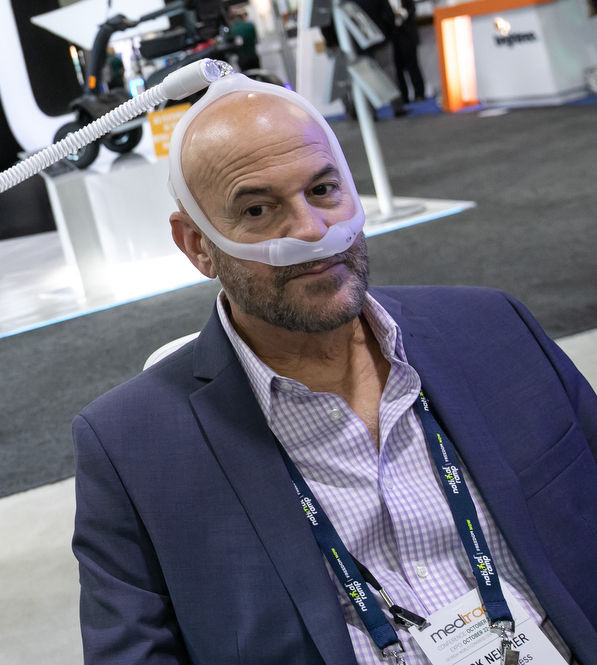ATLANTA – CPAP compliance and resupply management are key concerns for HME providers these days. Mark Boardman, CEO of Sleep Coaches (www.sleepcoaches.com) with offices in Minneapolis and Los Angeles, heard the concerns firsthand at last month’s Medtrade in Atlanta.
Attendees who paid a visit to the Sleep Coaches booth heard a new approach to a familiar problem. Created by a management team with 20+ years of DME and clinical experience, Sleep Coaches has developed a proprietary CPAP resupply outreach platform that keeps patients longer in their sleep therapy, producing more resupply orders and revenues over the industry’s traditional programs.
 Frustrated knowing that over 80% of CPAP patients fall off their therapy in the first year from placing patients on impersonal automated dialers (IVR) or a lack of in-house resources to follow up efficiently, Sleep Coaches aimed to fill this void. Specifically, Sleep Coaches outsources its services to HME/DMEs that want to accelerate the growth of their CPAP resupply business.
Frustrated knowing that over 80% of CPAP patients fall off their therapy in the first year from placing patients on impersonal automated dialers (IVR) or a lack of in-house resources to follow up efficiently, Sleep Coaches aimed to fill this void. Specifically, Sleep Coaches outsources its services to HME/DMEs that want to accelerate the growth of their CPAP resupply business.
“Our compliance and resupply platform reaches patients much easier and more efficiently with our technology and ‘personal touch’ approach,” says Boardman. “We assign a Sleep Coach that personally manages each patient’s account, to provide on-going education and answer any questions about their therapy.
“We take a patient-centric approach, allowing patients to choose one of many ordering methods that best fits with their lifestyle,” he continues. “By introducing an omni-channel platform, including live-call, texting, and e-mail, along with tele-health and loyalty components, we are able to maximize patient engagement and achieve the highest connection and order rates in the industry.”
Medtrade Monday sat down with Boardman to get a better idea of the company’s history, philosophy, and processes.
Medtrade Monday: What is the origin of Sleep Coaches?
Mark Boardman: We come out of the DME world. We previously owned our own respiratory-focused DME in Minnesota. When we were running our DME, we had respiratory therapists working for us, and at the time like most DMEs were using some form of IVR or auto dial system to follow up with patients when it was time for their resupply orders/eligibility dates.
Most IVRs, auto dial systems, or in-house programs have a connection rate of about 15%, which is consistent with any auto dial program across the country, whether health care, finance, or whatever. There’s about a 15% connection rate with auto dial coming into the home. To us, it was unacceptable that 85% of CPAP patients were not resupplying on a regular basis, critical to their lifetime care.
Medtrade Monday: What motivated you to try something better?
Boardman: Our RTs said, ‘We should be doing a better job connecting with our patients.’ They were right. They worked with us to put together a live call program to start following up with patients via a sleep coach. The coach would be clinically trained by the RT, and follow up with patients to see how things are going, monitor their utilization, HI, and leakage from the CPAP. They would talk to patients about how their therapy was going and getting direct feedback knowing that some patients’ utilization and ongoing care and therapy is going extremely well, while others might be struggling. The response from our patients was overwhelmingly positive resulting in dramatic increases in patient compliance, resupply orders, and retention.
 Medtrade Monday: What did you learn when you started to try this personal approach?
Medtrade Monday: What did you learn when you started to try this personal approach?
Boardman: We really needed to find out and understand from those who are struggling. What are the barriers? What are the initiatives that we can try to help them overcome? We needed to look at patient behavior and really become patient centric. As we became more patient-centric, using that one-to-one relationship between the sleep coach and the patient, we started to see that patient resupply orders went up; connection rates went up. Rather than 15%, we tripled that to 45%. We have even gone north of 50% to 60% at times.
Medtrade Monday: What additional advantages were you finding with this personal touch?
Boardman: If patients were due for a mask change, we were always getting a mask in there, whereas with IVR and autodial calls, if a patient didn’t reorder a mask, the next time that auto-call comes into the house it may only remember the prior order. When it comes to equipment management, that’s part of their ongoing therapy. We need to make sure they are changing out the masks and cushions, filters, and tubing because of bacterial break up. Masks break down over time with usage. If a mask isn’t feeling as comfortable as before, it’s because it’s been used. All of that comes into that ongoing education and therapy between the coach and the patient. From all of that, we were able to start maximizing quality orders based on what the allowable was and who the patient’s payer was.
Medtrade Monday: What additional advantages were you seeing over the auto call or an in-house program?
Boardman: When we were on the auto call, we were averaging about 1.2 to 1.4 orders per patient per year, and we more than doubled that to between 2.8 and 3.2 orders per patient per year with Sleep Coaches. We get some patients who are eligible to change out their mask and equipment four times a year, based on the payer, and they’ll change it out four times a year. So it was obviously good for the patient, kept them in their therapy longer.
We were changing out orders more consistently, helping patients if they were having challenges, reminding them that sleep apnea is a chronic disease and the importance of maintaining their ongoing therapy. We don’t want comorbidities to set in, like diabetes, obesity, high blood pressure, stroke, chronic heart failure—all of those things that patients aren’t told at time of set up. It’s the coach’s responsibility to educate the patient with those things.

Medtrade Monday: What’s the fundamental reason you’re able to get those great results?
Boardman: All of that is because we elevated the patient engagement. With auto-dial, there’s no patient engagement involved. It’s a robo-dial that goes in and remembers their last order history, and that’s what they work on. When we turn this into a live call program, we have the opportunity of patient engagement. You can ask how their CPAP therapy is going and get them in for a refit if needed.
A lot of them don’t realize that they can change their mask out four times a year and insurance will cover it. Other programs only get 1.2 orders per year, where we get up to three or more orders a year. That’s going to double or triple CPAP revenue with the Sleep Coaches program.
The other thing we found out is with all of that and the one-to-one relationship, the patients loved it. They truly felt like they were valued and somebody was following up with them with ongoing care. It made the patient more accountable for their overall care, similar to if somebody’s got a personal trainer or a physical therapist. Now they’ve got a sleep coach. They’re working with someone who holds them accountable, and that’s very important in keeping someone in their ongoing therapy, so patient retention went up as well. We almost doubled patient retention from 20% to 25% to up into the 60% range.
Medtrade Monday: A lot of companies talk about patient centric, but what does that mean to you?
Boardman: It’s all predicated on live call and establishing the one-to-one relationship between the patient and their sleep coach. Once we establish that patient-to-coach relationship, we can begin to offer other forms of communication and ordering based on the patient’s preference. This is an Omni-Channel approach where we connect to patients through a digital application for those who want that sort of communication. That is very different to what anyone else is doing because there are some folks who want us to reach out via text. That’s ok too and that works out well. For us, when you take a patient-centric approach, it’s always about understanding patients and finding the best way to engage with them and communicate with them.

